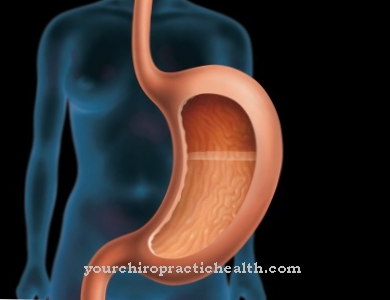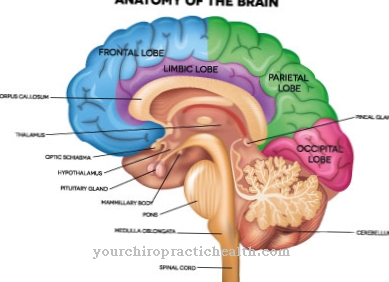Narcolepsy is a disease belonging to the group of sleep addictions, which is characterized by sleep attacks and cataplexies. Although there are several ways to control the disease, to this day there is no cure.
What is narcolepsy?

© Andrey Popov - stock.adobe.com
At Narcolepsy it is a neurological disease that is associated with severe daytime sleepiness and uncontrollable sleep attacks.
The sudden, strong urge to sleep occurs especially in times of stress or in situations of great emotionality, such as joy. The excessive urge to sleep cannot be counteracted by increased rest periods or longer periods of sleep. Narcolepsy, too Sleeping sickness called, is a rare disease and belongs to the group of hypersomnias. Narcolepsy is an enormous psychological burden not only for the person affected, but also for relatives and friends.
After all, the environment must be constantly on guard and, if necessary, catch the person affected so that he does not get injured if he suddenly collapses. The typical and sudden collapse of those affected, cataplexy, is a main symptom of narcolepsy.
causes
Although the causes for the occurrence of this disease are still relatively unknown, it is now believed that it is an autoimmune disease.
It is believed that the person's immune system destroys the cells in the brain that make the neuropeptide hormone orexin. Orexin plays a crucial role in controlling the wake-sleep rhythm. In addition, many patients with narcolepsy have a defect in a T-cell receptor, which makes it difficult to fight off infections.
Scientists agree that narcolepsy is not a mental illness, so it is not caused by mental emergencies or psychiatric illnesses. In some cases, narcolepsy occurs in families, but this is not always the case, so genetic components may only play a small role in the development of the disease.
Symptoms, ailments & signs
Depending on the cause, narcolepsy shows different symptoms. Some of the symptoms are considered typical and occur with all forms of the disease. The main symptom is the excessive need for sleep, which patients cannot resist. It is particularly triggered by dim lighting and in darkened rooms, such as in the cinema or during lectures. Monotonous or boring situations also cause drowsiness.
Affected people don't just get extremely tired, they fall asleep. This can happen during a conversation or a meal, at work in the office, but also while driving. People are unable to prevent falling asleep. Sometimes there is also a sudden relaxation of the muscles, which is known as cataplexy.
The patients remain awake, but slump in an uncontrolled manner, as if they were faint. It is possible to wake them up, but most of the time they will go back to sleep immediately. The onset of drowsiness is usually shown in advance by a glassy, absent look, speech becomes indistinct and the person appears drunk.
Other special symptoms that occur depending on the cause are disturbed night sleep, paralysis during sleep, hallucinations, headaches, depression, memory disorders and a reduced ability to concentrate. Blurred vision, irritability, breathing pauses and loud snoring during sleep are also possible
Diagnosis & course
When making the diagnosis, the attending physician first takes a detailed anamnesis. He pays particular attention to the patient's sleeping habits. The doctor also determines whether the patient has the characteristic symptoms of Narcolepsy suffers.
In addition to sudden sleep attacks, this also includes a loss of muscle tone that actually only occurs during deep sleep. If the symptoms determined by the medical history confirm the suspicion of narcolepsy, the general practitioner or pediatrician will order a full physical examination to find possible other causes of the symptoms.
If the physical examination remains without results, the doctor will refer the patient to a doctor who specializes in sleep medicine. Subsequently, the patient is usually observed in a sleep laboratory. The measurements made there are used to assess the severity of narcolepsy. Basically, the process is good if the patients learn to deal with their disease and take the right medication.
Complications
Because of narcolepsy, those affected primarily suffer from severe sleep problems. This leads to pronounced fatigue, which occurs on the first day and thus significantly reduces the quality of life. Those affected feel tired and exhausted and continue to suffer from significantly reduced resilience.
The sleep rhythm itself is also abnormal. In some cases, those affected suffer briefly from muscle paralysis or from disorders of consciousness, which can also make everyday life difficult. It is not uncommon for paralysis to occur during sleep itself, which is associated with anxiety. Hallucinations can also occur from narcolepsy.
Furthermore, this disease has a very negative effect on the relationship with one's own partner, so that there may be tension. Treatment of narcolepsy can be done with the help of medication. This can also lead to dependency. However, psychological therapy is also necessary to treat this disease. However, it cannot be guaranteed whether this will be successful. Narcolepsy usually does not have a negative impact on the life expectancy of the person affected.
When should you go to the doctor?
Narcolepsy sufferers should seek out a family doctor in their area who already has specialist knowledge in this area. The health insurance companies usually provide information on this, and the Medical Association also has useful information on the specialties of individual doctors. It is important and useful for people who are sick to keep the distances short. It is also advisable to have someone with you at all times. If there is no one in your environment who can accompany you, it is also possible to get support from a self-help association. They usually know advice even in difficult life situations, always have constructive words for the patient and know general practitioners who are experienced in the field of narcolepsy.
To diagnose the disease and clarify its severity, the family doctor usually first refers you to a sleep laboratory. Among other things, the brain waves are measured there and further, detailed examinations are carried out. A visit to a neurologist is usually recommended afterwards in order to rule out psychiatric and neurological diseases as the cause. Little is known about narcolepsy and diagnosis takes a long time, in some cases even several years.
Treatment & Therapy
Narcolepsy is still not curable today. Nevertheless, there are drugs with which the sleep attacks can be better controlled or in some cases even prevented.
The medication for narcolepsy is complicated, as there is no drug against narcolepsy per se, but the various symptoms are treated with appropriate drugs. Even if good partial success can be achieved with the individually tailored drug therapy, it is not possible to get narcolepsy under control in this way alone.
In most cases, those affected are recommended to undergo behavioral therapy. This enables them to learn to deal better with their illness and to develop strategies to lead a life as normal as possible despite their narcolepsy. In order to avoid injuries, it is important that those affected are aware of the dangers and develop a good body image so that, for example, they only turn on the stove when they feel that they will not fall asleep.
You can find your medication here
➔ Medication for sleep disordersOutlook & forecast
The prognosis for narcolepsy depends on the person's ability to deal with the disease. The ailment does not heal on its own, nor is it causally treatable. Accordingly, the problem remains lifelong and can only be alleviated by medication.
Many people with narcolepsy are able to lead a largely intact life. However, there are often professional and social restrictions that stand in the way of personal development. This can sometimes have a very strong effect on the quality of life and reduce it. Affected people sometimes experience depression or social phobias. Both are due to actual and feared limitations as a result of narcolepsy. Furthermore, financial losses often lead to financially difficult situations for those affected. This is especially true if narcolepsy is undiagnosed and treated.
An adapted sleep rhythm with regular rest breaks and the avoidance of triggering situations can improve the quality of life. Those affected can spend most of the day awake and unrestricted. Due to the many side effects, including possible accidents, the mortality rate is increased by a factor of around 1.5. Accordingly, narcolepsy often causes death, directly or indirectly. This risk remains lifelong, but can be reduced thanks to medication.
prevention
Since the exact causes for the development of this disease are unknown, there are no sensible measures that could be used prophylactically. People who already have narcolepsy can only prevent accidents. So they should neither swim nor drive a car nor inform those around them about their illness.
Aftercare
Treatment and follow-up care for patients suffering from narcolepsy flow into one another. This disease is generally not curable, but it can be treated. The affected person has to take medication for a lifetime. Most of these are drugs that belong to the group of narcotics.
Professional support from a specialized doctor is therefore essential. The patient can contact the German Narcolepsy Society (DNG) for proper medical care. Both the condition and the possible side effects of some drugs can reduce the patient's quality of life. The sufferer can develop depression.
Participation in public life is made difficult by the possibility of falling asleep at any time. Regular meetings in the form of self-help groups and professional psychological treatment can alleviate the patient's suffering. The social environment such as family and friends is also very important for the patient.
Their support and understanding make it easier for those affected to deal with their illness. Patients need to learn to deal with the disease. With increasing experience in dealing with the disease, they can cope better with everyday life. However, practicing a profession is usually no longer possible.
You can do that yourself
To improve health, narcolepsy patients can take various self-help measures that are not based on medication. Sleep hygiene should be optimized. The choice of mattress, the ambient temperature, the bedding and possible light influences must be adapted to the needs of the organism. It should be possible to rule out possible noises caused by external influences or the sudden ringing of a telephone. Restful and adequate sleep can go a long way in relieving symptoms.
Refrain from consuming caffeine-containing substances for several hours before you go to bed. The daily routine should have a regularity in which the rest phases run in the same constant rhythms over a longer period of time. Sleep and wake rhythms can be documented in sleep logs. Using the notes, you can work out improvements and develop your own strategies. Sufficient breaks and naps should be taken in everyday life. The person concerned has to learn when his organism needs sleep and follow these impulses.
Avoid stress and hectic. In order to avoid a decline in well-being or a lack of exercise, regular sporting activities should take place. Advice for improved behavior in coping with everyday life must be taken into account and implemented. An exchange of the affected person in self-help groups can also be helpful and beneficial.













.jpg)

.jpg)
.jpg)











.jpg)